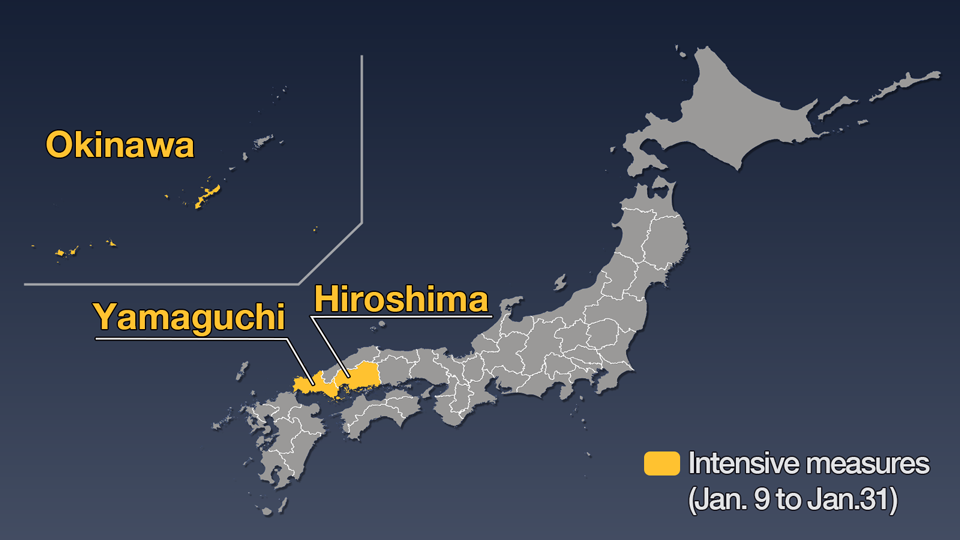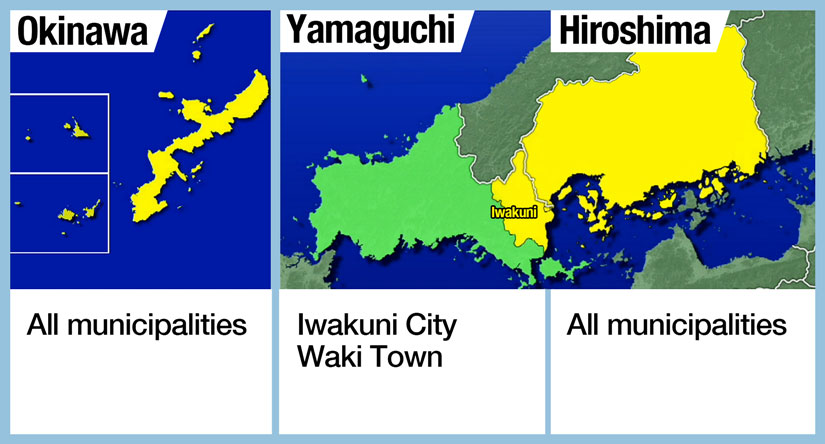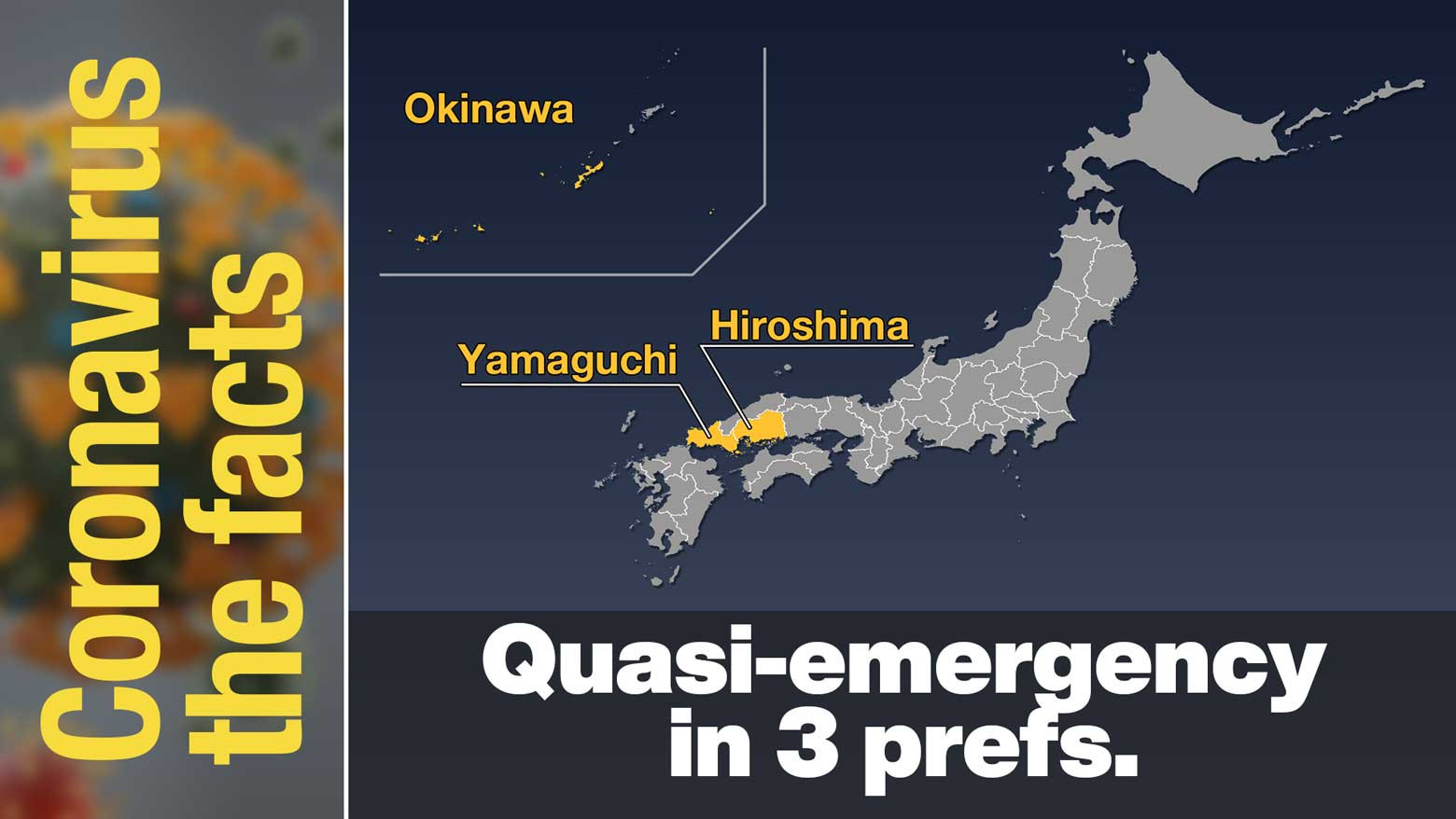This is our series on key coronavirus-related information. Click here to read other installments: #Coronavirus the facts. Find the latest information and answers from experts on everything COVID-19.
*This article was updated on January 14, 2022.
Quasi-emergency to run through January 31
On January 9, the Japanese government declared a quasi-emergency, a preliminary step toward a state of emergency, in three prefectures---Okinawa, Yamaguchi and Hiroshima---where the coronavirus is rapidly spreading.
Prefectural governors can impose stricter measures in areas facing outbreaks to ensure medical systems are not overwhelmed. This is the first time since September that the measures have been implemented.
Local officials have suggested the highly-transmissible Omicron variant is spilling out of US bases. The Japanese and US governments have agreed to restrict outings by US military personnel across Japan for two weeks from January 10.
Target areas


The following areas are subject to the stricter measures:
Okinawa Prefecture
The entire prefecture
Yamaguchi Prefecture
The city of Iwakuni, which hosts the US Marine Corps Air Station Iwakuni, and the neighboring town of Waki
Hiroshima Prefecture
The entire prefecture
Okinawa measures
Dining
Dining establishments with certified anti-infection measures in place are being asked to close by 9 p.m. and finish serving alcohol by 8 p.m. Establishments without such certification are being asked to close by 8 p.m. and stop serving alcohol.
Certified small and mid-sized dining establishments that comply will be provided 25,000 to 75,000 yen (about $220 to $650) per day, depending on their sales. Uncertified establishments that comply will be given 30,000 to 100,000 yen (about $260 to $870) per day. Large operators that comply will receive up to 200,000 yen (about $1,700) per day.
Certified establishments that stop serving alcohol and close by 8 p.m. will receive the same subsidies as those given to uncertified establishments.
Excursions
People in the prefecture are being asked to refrain from visiting dining establishments that do not comply with the requests. If dining outside, groups should be a maximum of four people who are family members or frequently together, and stays should be no longer than two hours.
People are being asked to refrain from visiting crowded or high-risk areas and avoid non-essential travel to other prefectures or other islands within the prefecture.
School
Students at prefectural schools will attend classes on alternate days. When schools are forced to close due to infections, classes will continue online or by other means. Extracurricular activities will, in principle, be suspended.
Companies
Companies and business organizations are being asked to reduce opportunities for contact between people, including reducing the number of commuters through measures such as teleworking and staggered working hours.
Events
Attendance caps for large-scale events are in place for up to 20,000 people.
At venues with a 5,000-person capacity or less, organizers are allowed to fill the venue to capacity if they expect the event to feature a quieter audience. But if they expect a loud audience, they must operate at half capacity.
At venues with a 5,000- to 20,000-capacity, organizers are allowed to fill the venue if they expect the event to feature a quieter audience. But they must also submit a plan outlining anti-infection measures to local authorities two weeks before the date of the event.
Yamaguchi measures
Dining
Dining establishments in Iwakuni and Waki are being asked to close by 8 p.m. and stop serving alcohol. Establishments that comply will be subsidized.
Excursion
Residents of Iwakuni and Waki are being asked to reduce their number of excursions by half. If dining outside, groups should be no larger than four people.
All people in the prefecture are being asked to exercise caution when deciding whether to travel to and from areas where infections are increasing.
Companies
Companies and business organizations are being asked to allow remote work where possible. Those that cannot should strengthen anti-infection measures in workplaces.
Events
Attendance for large-scale events will be capped at 20,000 people. Organizers must ask prefectural authorities in advance and submit anti-infection plans for events with audiences of over 5,000 or half capacity.
Hiroshima measures
Dining
Dining establishments are being asked to close by 8 p.m. and stop serving alcohol. Businesses that comply will be eligible for financial assistance. Groups should be no larger than four people.
Small and mid-sized dining establishments will receive 30,000 to 100,000 yen (about $260 to $870) per day. Large operators will receive up to 200,000 yen (about $1,700) per day.
Excursion
Residents are being asked to reduce their number of excursions by half and refrain from nonessential travel across prefectural borders.
Companies
Companies and business organizations are being asked to allow remote work or reduce the number of working days.
Events
Crowd sizes are limited to 5,000 or half capacity, whichever is lower. Organizers whose anti-infection plans are confirmed by the prefecture are allowed to fill their venues with up to 20,000 people.
Organizers are being asked not to sell new tickets for events that do not meet these conditions.
This information was updated on January 14, 2022.
